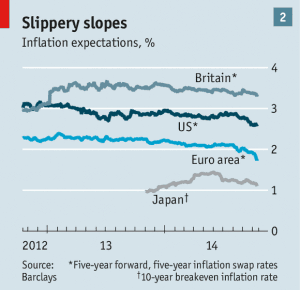The standoff between the Greek government and most other EU governments continues. The other governments are happy to extend loan facilities, but only if Greece stands by the conditions it had previously agreed. For the Greeks that is anathema, because it means holding to austerity. Many observers here in Britain seem to sympathise with the Greek side. And they offer a middle way: reform without austerity.
Three columns in the FT make the case. I have provided links, but beware – the FT operates a paywall with a very limited number of free goes. First was the weighty (intellectually) Martin Wolf. He condemns the EU programme for focusing too much on austerity and not enough on reform. Austerity sucks demand out of the economy, causing mass hardship; reform would make Greece’s economy more efficient. Next came the intellectually much lighter Tony Blair: Two false paths for Europe – and a new third way. This puts the idea into more overt political terms, though conjuring up memories of his own British “third way” that was politically successful for a while, but whose reputation is now somewhat tarnished. As an aside this is interesting because it shows that Mr Blair accepts uncritically the basic left wing economic narrative – looser fiscal and monetary policy will lead to growth. On Monday was regular FT columnist Wolfgang Munchau: Athens must stand firm on failed policies. This is positively vitriolic about the EU conventional wisdom on austerity, which he regards as economically illiterate and a complete failure. This article contributes to the picture by exploring Greece’s options in the event of breakdown, including the intriguing one of the country printing its own money.
So what to think? Austerity refers to the reduction of public spending and the increase of taxation. It is considered economically counterproductive because it sucks demand out of the economy, which in turn knocks tax receipts – which makes things worse by creating a downward spiral. In Greece’s case the object of vitriol is the target that the government should run a primary budget surplus of 3% , to pay for debt interest, which comes to about 3%, after the recent restructurings (and a remarkably low figure for debt of 175% of GDP). Surely even prudent governments should be allowed a deficit in a recession? So what about reform? It is here that each of these commentators is awkwardly silent. Just what on earth do they mean?
Economic reforms to promote efficiency usually mean changes to product and labour market regulation to make them more open to free market forces. These are undoubtedly required in Greece. But they promote short-term insecurity to jobs and businesses. They are not politically popular, and I doubt very much that there that the Greek public distinguishes between these reforms and austerity. They all part of the same hateful phenomenon.
And the problem goes deeper. Regulation tends to create public service jobs., which deregulation threatens. Besides it is the scale of the public sector, both in terms of jobs and transfer payments, that is a large part of the problem. In several ways this undermines a dynamic private sector. They tie up resources; they undermine labour markets, and so on. For too many people the way to wealth involves politicking rather than delivering things that people actually need and want. And so reform often means cuts – which is back to austerity.
In fact to find ways of stimulating demand without blocking reform is quite hard. There is the economists’ old favourite: investment. But efficient public investment requires an efficient state to direct it. Otherwise the money simply lines the pockets of well-connected people. Surely Greece is vulnerable to this? More bank lending? Another can of worms. Frankly I will not be convinced that reform without austerity is a possibility until somebody can spell out a programme which delivers it. The Greek government is proposing a reversal of both austerity and reform. Once again British (and American) economists are guilty of using macroeconomic analysis to skate over practical problems that turn out to be the very heart of the issue.
There may be some hope a middle way though. Perhaps some fudge around economic cycles can be used to cut the target for primary surplus. And there must be some opportunity to reshape the austerity/reform programme to put more weight on collecting tax from wealthiest – which the new Greek government seems much better placed to do that the last. Alas I am too far away from it all to have any feel for how likely such a deal might be. All I will say is that British commentators are generous with the taxpayers’ money of other nations, but their credibility would rise if they suggested that British taxpayers should join in. All the talk of respecting Greek democracy would then be put into a clearer perspective.
Meanwhile it seems quite likely that there will be some kind of Greek default. Following Mr Munchau it looks quite likely that the Greek government would issue some form of electronic currency of its own, in the from of IOUs, to keep things going. This may well be against the letter of the rules for the Euro area, but it could buy enough time for a compromise to be reached. And perhaps the development of a safety mechanism for the Euro currency area. The Eurozone needs to find some sort of middle way between the inflexibility of a gold standard, and the creation of a federal state without democratic consent. Might what amounts to local currencies be part of this?
Meanwhile, as the saying goes, if something looks too good to be true, it probably is. That is surely the case for reform without austerity. Sorry Mr Blair.

